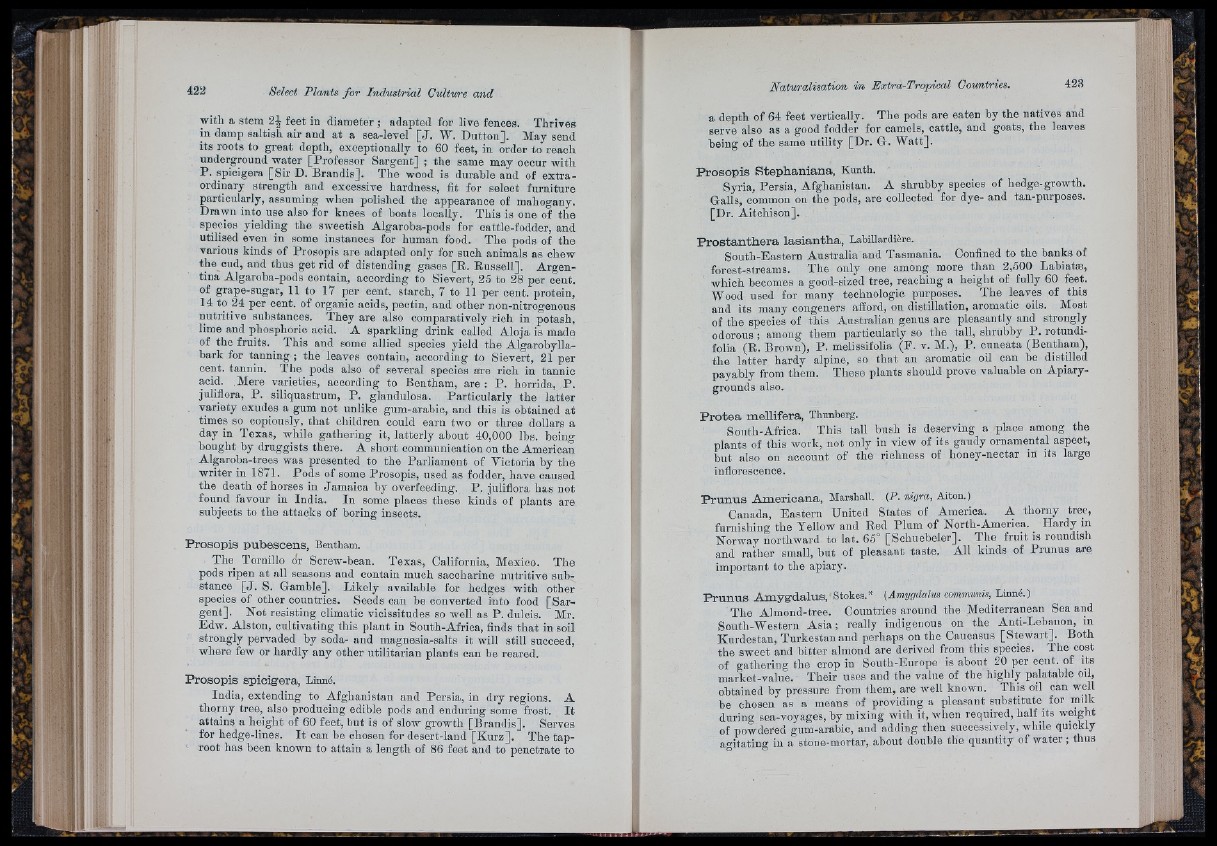
423
with a stem 2 J feet in diameter ; adapted for live fences. Thrives
in damp saltish air and a t a sea-level [ J . W. Dutton]. May send
its roots to great depth, exceptionally to 60 feet, in order to reach
underground water [Professor Sargent] ; the same may occur with
P. spicigera [S ir D. Brandis]. The wood is durable and of extra-
ordinary strength and excessive hardness, fit for select furniture
particulariy, assuming when polished the appearance of mahogany.
Drawn into use also for knees of boats locally. This is one of the
spemes yielding the sweetish Algaroba-pods for cattle-fodder, and
utilised even in some instances for human food. The pods of the
various kinds of Prosopis are adapted only for such animals as chew
the cud, and thus get rid of distending gases [K. Russell]. Argentina
Algaroha-pods contain, according to Sievert, 25 to 28 per cent,
of grape-sugar, 11 to 17 per cent, starch, 7 to 11 per cent, protein,
14 to 24 per cent, of organic acids, pectin, and other non-nitrogenous
nutritive substances. They are also comparatively rich in potash,
lime and phosphoric acid. A sparkling drink called Aloja is made
of the fruits. This aud some allied species yield the Algarobylla-
bark for tanning ; the leaves contain, according to Sievert, 21 per
cent, tannin. The pods also of several species are rich in tannic
acid. .Mere varieties, according to Bentham, are : P . hórrida, P.
julifiora, P. siliquastrum, P . glandulosa. Particularly the latter
variety exudes a gum not unlike gum-arabic, and this is obtained at
times so copiously, that children could earn two or three dollars a
day in Texas, while gathering it, latterly about 40,000 lbs. being
bought by druggists there. A short communication on the American
Algaroba-trej3S was presented to the Parliament of Victoria by the
writer in 1871. Pods of some Prosopis, used as fodder, have caused
the death of horses in Jamaica by overfeeding. P. juliflora has not
found favour iu India. In some places these kinds of plants are
subjects to the attacks of boring insects.
P ro s o p is p u b e s c e n s , Bentham.
The Tornillo o'r Screw-bean. Texas, California, Mexico. The
pods ripen a t all seasons and contain much saccharine nutritive substance
[ J . S. Gamble]. Likely available for hedges with other
species of other countries. Seeds can be converted into food [Sargent].
Not resisting climatic vicissitudes so well as P. dulcis. Mr.
Edw. Alston, eultivating this plant in South-Africa, finds th a t in soil
strongly pervaded by soda- and magnesia-salts it will still succeed,
where few or hardly any other utilitarian plants can be reared.
P ro s o p is sp ic ig e ra , Biimé.
India, extending to Afghanistan and Persia, iu dry regions. A
thorny tree, also producing edible pods and enduring some frost. I t
attains a height of 60 feet, but is of slow growth [Brandis], Serves
for hedge-lines. I t can be chosen for desert-land [K u rz ]. The tap root
has been known to attain a length of 86 feet and to penetrate to
a depth of 64 feet vertically. The pods are eaten by the natives and
serve also as a good fodder for camels, cattle, and goats, the leaves
being of the same utility [Dr. G. Wa tt].
Prosopis Stepbaniana, Kunth.
Syria, Persia, Afghanistan. A shrubby species of hedge-growth.
Galls, common on the pods, are collected for dye- and tan-purposes.
[Dr. Aitchison].
Prostantbera lasiantba, Labillardière.
South-Eastern Australia and Tasmania. Confined to the banks of
forest-streams. The only one among more than 2,500 Labiatæ,
which becomes a good-sized tree, reaching a height of fully 60 feet.
Wood used for many technologic purposes. The leaves of this
and its many congeners afford, on distillation, aromatic oils. Most
of the species of this Australian genus are pleasantly and strongly
odorous ; among them particularly so the tall, shrubby P . rotundifolia
(R. Brown), P . melissifolia (F. v. M.), P. cuneata (Bentham),
th e latter hardy alpine, so th a t an aromatic oil ean be distilled
payahly from them. These plants should prove valuable ou Apiary-
grouuds also.
Protea meUifera, Thunberg.
South-Africa. This tall bush is deserving a place among the
plants of this work, not only in view of its gaudy ornamental aspect,
but also on account of the richness of honey-nectar in its large
inflorescence.
Prunus Americana, Marshall. (P. nigra, Aiton.)
Canada, Eastern United States of America. A thorny tree,
furnishing the Yellow and Red Plum of North-America. Hardy in
Norway northward to lat. 65° [Schnebeler]. The fruit is roundish
and rather small, but of pleasant taste. All kinds of Prunus are
important to tlie apiary.
Prunus Amyg-dalus, Stokes.* (Amygdalus communis, Linné.)
The Almond-tree. Countries around the Mediterranean Sea aiM
South-Western A sia ; really indigenous on the Anti-Lebanon, in
Kurdestan, Turkestan and perhaps on the Caucasus [Stewart]. Both
the sweet and hitter almond are derived from this species. The cost
of gathering the crop in South-Europe is about 20 per cent, of its
market-value. Their uses and the value of the highly pffiatable oil,
obtained by pressure from them, are well known. Tbis oil can well
be chosen as a means of providing a pleasant rabstitute_ for milk
during sea-voyages, by mixing witli it, when required, half its weight
of powdered gum-arabic, and adding then successively, while quickly
agitating iu a stone-mortar, about double the quantity of water ; thus